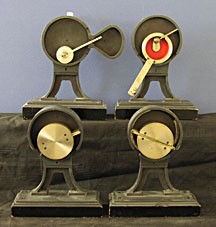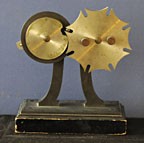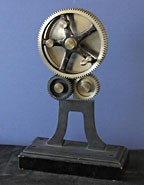Cornell's collection of 19th-century teaching machines to be part of NSF-funded online digital science library
By John M. Saylor
Cornell University's collection of 220 mechanical teaching models from the 19th century, the largest such collection in the world, soon will be available on the Internet to students and teachers.
The National Science Foundation (NSF) has awarded Cornell University Library a $725,088 grant to create a digital collection of the historical machines for the National Science Digital Library (NSDL).
"We're trying to bring the models back into use as they were originally designed. They were designed for classroom use," explains Francis C. Moon, the J.C. Ford Professor of Mechanical and Aerospace Engineering at Cornell and curator of the Cornell Reuleaux Collection of Kinematic Models. "But rather than being limited to one classroom, this will be a national resource. We plan to have more than just static pictures. We will allow the user to walk around the models and even move them, see them move, and associate the [physical] models with the mathematical models."
The Kinematic Models for Design Digital Library (K-MODDL) will be a collection of digital images (still and moving) of mechanical models that were designed to teach the underlying mathematical principles by which machines work, focusing initially on Cornell's collection. The NSDL project is scheduled for completion in two years.
The kinematic models were developed for research and teaching by German engineering professor Franz Reuleaux (1829-1905) who taught at a technical university in Berlin. He was the founder of modern kinematics, or the science of motion, and a forerunner of modern design theory of machines. Some 800 Reuleaux machines were built, but most of those stored in Europe were destroyed during World War II. Reuleaux believed that machines could be deconstructed into simple elements, and the collection was supposed to illustrate these principles. The machines range from simple examples of basic gearing mechanisms to detailed reproductions of watch movements.
Cornell's collection was purchased in the late 1800s by Andrew Dickson White, the first president of Cornell, who is believed to have met Reuleaux during his diplomatic service as American ambassador to Germany.
The K-MODDL project will expand a pilot database of still images and descriptive records of Cornell's Reuleaux models, developed with funding from Cornell University Library. The web site will include computer simulations of the models' movements, related full-text documents in digital form and sample teaching modules to be used at the undergraduate, high school and middle school levels. Users will be able to view the mechanisms from several perspectives and control their movement on the web.
The NSF grant includes funding for the digitization of related historical and rare books from the Cornell University Library collections. "Cornell has some very important books on the history of machines," Moon notes. These materials will be incorporated in full-text form into the online collection, allowing educators at other universities and schools to take advantage of Cornell's collections in engineering and applied science.
The K-MODDL project team will work closely with local middle and high school teachers in the vicinity of Ithaca, N.Y., and with Cornell faculty to develop learning modules that will be available to any teacher. Users will be able to add to K-MODDL with annotations and links to related materials. The project team also plans to develop collaborations with museums in Europe and Japan to create a worldwide museum and digital library of machine mechanisms.
The K-MODDL project is a collaboration of librarians, professors of mathematics and mechanical engineering, and education specialists at Cornell. John M. Saylor, director of the Cornell Engineering Library, is the principal investigator. Co-principal investigators, in addition to Moon, are David W. Henderson, professor of mathematics, and Hod Lipson, assistant professor of mechanical engineering and computing and information science. Daina Taimina, courtesy assistant professor of mathematics, will oversee preparation of learning modules for schools, and Donald Bartel, professor of mechanical and aerospace engineering, will collaborate on university-level learning modules. Other team members include project manager Kizer Walker and web site designer Kristina Buhrman, both of the Cornell Engineering, Mathematics and Physical Sciences Libraries.
The Reuleaux collection is on display on the second floor of Upson Hall on the Cornell campus.
Media Contact
Get Cornell news delivered right to your inbox.
Subscribe

